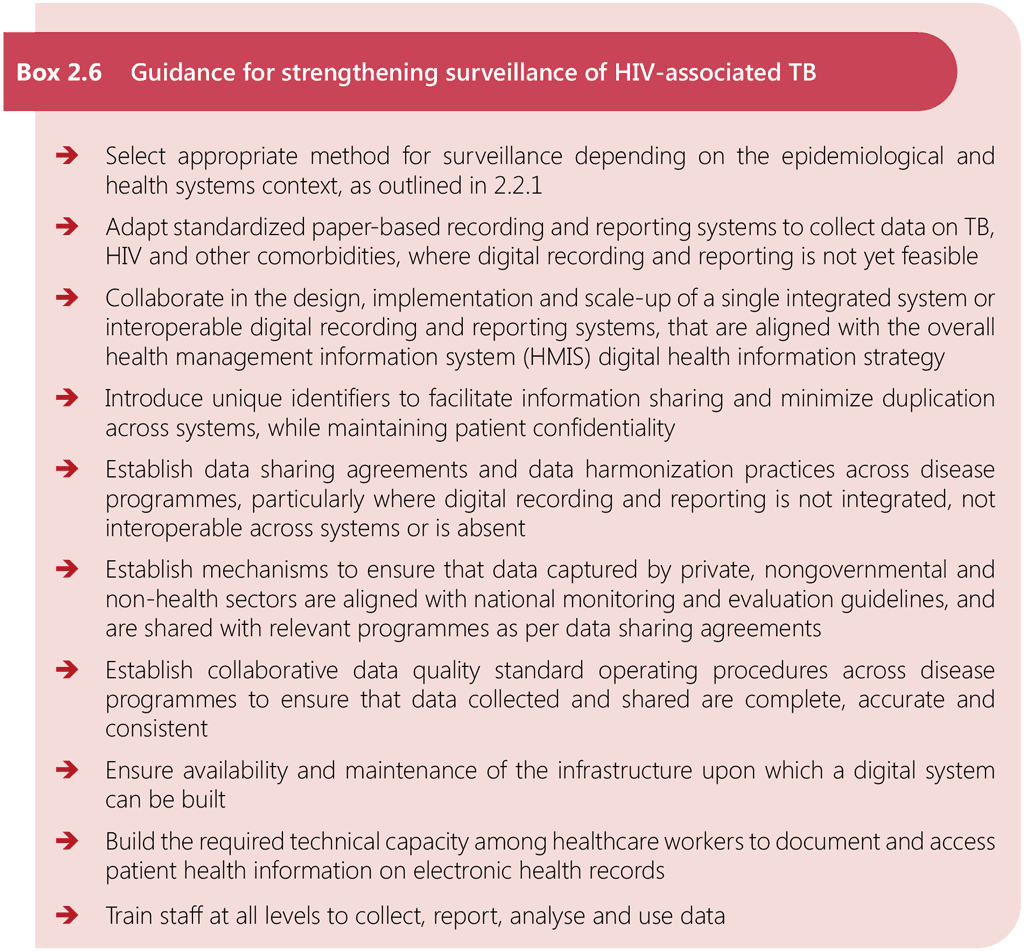كتاب روابط اجتياز لـ 1266

2.5.1 Adopt indicators and set targets for collaborative TB/HIV activities
TB and HIV programmes should jointly identify harmonized indicators to avoid duplication of effort (65). Clear definitions of indicators can drive progress and accountability, especially if linked with established accountability mechanisms such as the Multisectoral accountability framework for TB (25). Recommended core indicators can be found in Annex 1. Additional indicators that may be adopted at the national level are included in the WHO’s A guide to monitoring and evaluation for collaborative TB/HIV activities (65) and the Consolidated HIV strategic information guidelines: driving impact through programme monitoring and management (66). Countries should also set time-bound targets to scale up people-centred collaborative TB/HIV activities, which can strengthen collaboration between programmes, promote involvement across sectors and help to mobilize political commitment (7).
2.5.2 Strengthen surveillance for HIV among people with TB, and surveillance for TB among people with HIV in accordance with WHO recommendations
Surveillance and regular assessment are essential to inform budgeting, planning and implementation of services for HIV-associated TB. To this end, countries should strengthen their surveillance in accordance with the epidemiological context, build staff capacity to record and use data, and scale up interoperable electronic recording and reporting systems. Data from a range of non-health sectors may also be utilized to promote multisectoral action and accountability. The sources may include, inter alia, the prison sector, mining sector and social services (67). The checklist in Box 2.6 may be used to support implementation and scale-up of systems for the surveillance of TB and HIV prevalence.

2.5.3 Introduce and scale up monitoring and evaluation of collaborative TB/HIV activities at all levels
Joint monitoring and evaluation activities provide the means to assess the quality, effectiveness, coverage and delivery of collaborative TB/HIV activities. They promote a learning culture within and across the programmes and ensure continuous improvement of individual and joint programme performance. Monitoring and evaluation involves collaboration between the TB and HIV programmes and the general health system (public and private), the development of referral linkages between different services and organizations, and joint supervision.
As part of scale-up, recording and reporting tools should be co-developed by the TB and HIV programmes, and standardized and updated to capture and strengthen data on the continuum of care for TB and HIV. The rapid development of digital technology provides novel opportunities for collecting and analysing data, including among subpopulations (67-69). During the introduction of digital systems, programmes should strive to implement either an integrated digital recording and reporting system or one that is interoperable with other systems used by other programmes, such as DHIS2 (70), which can facilitate the co-management, referral and follow-up of people in care. Similarly, digital systems should be designed to facilitate the visualization of data in real-time for rapid analysis of emerging trends in TB/HIV epidemiology. It is important that all digital systems safeguard the confidentiality of patient data throughout implementation (69, 71).
2.5.4 Conduct joint reviews of quality and coverage of services to inform programming
To ensure quality, the national TB and HIV programmes at the different levels should conduct joint reviews as part of regular quarterly supervision activities. Results from joint supervision should be used to mentor, adapt and adjust the response to HIV-associated TB, in order to drive performance improvement.
To assess progress of implementation of the respective TB and HIV national strategic plans in generalized HIV epidemic settings, countries may choose to conduct one joint TB and HIV programme review. Alternatively, countries may choose to keep to disease-specific reviews with active participation by staff from the other programme. Other TB and HIV stakeholders, healthcare and social-protection providers, and affected communities should also be engaged during programme reviews and to appraise the evidence. WHO has recently developed guidance on TB programme reviews, which includes checklists for HIV and other comorbidities.
2.5.5 Conduct operational and implementation research to inform policy, programming and service delivery
All stakeholders of collaborative TB/HIV activities, including HIV programmes and national TB programmes, should support and encourage operational research on country-specific issues to develop the evidence base for efficient and effective implementation of collaborative TB/HIV activities (7). Operational research is needed to define how best to provide high-quality integrated TB and HIV interventions at facility and community levels to inform global and national policy and strategy development, and fine-tune programming and human rights-based people-centred service delivery (72). Consolidated research priorities are summarized in the WHO consolidated guidelines on tuberculosis. Module 6: tuberculosis and comorbidities TB (in press).

 تعليق
تعليق